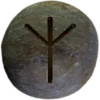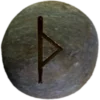Last Updated on June 4, 2025
Table of Contents


Description and Mythology
Skaði (pronounced SKAH-thee, with the “ð” as a soft “th” sound) is a Jötunn (giantess) associated with winter, hunting, skiing, and mountains. Her name is sometimes spelled “Skadi” or “Skathi” in English texts. Her tale begins with the death of her father, Þjazi (pronounced THYAH-see), who was slain by the Æsir gods. Seeking vengeance, she armed herself and approached the gods’ stronghold in Asgard (pronounced AZ-gahrd). ![]()
Rather than fighting, the gods offered her reparations. As compensation, Skaði chose a husband from among the gods but could only select by observing their feet. She chose Njörðr (pronounced NYOR-thur), a Vanir god associated with the sea. However, their union proved unhappy due to their differing preferences for homes. Njörðr loved the sea, while she preferred the mountains. The Prose Edda, written by Snorri Sturluson, recounts their failed marriage.
Skaði’s independence shines through in her stories. She left Njörðr and returned to her beloved mountain home, where the god, Loki, lightened her mood after Þjazi’s death by making her laugh in a peculiar and humiliating way. Her bow-hunting and skiing prowess earned her titles like, “The Snowshoe Goddess.” These associations reflect the harsh yet beautiful Nordic landscapes and the skills needed to survive them.
In addition to the Prose Edda, Skaði’s story appears in the Poetic Edda. Her presence in these texts emphasizes her importance in the mythology of the Norse people.
Runes Associated with Skaði
Two Elder Futhark runes connect with Skaði’s attributes. The first is Isaz (ᛁ), representing ice and stillness. This rune mirrors her connection to winter’s cold and the calm of snow-covered mountains. Isaz symbolizes focus and clarity amidst harsh conditions. ![]()
The second rune, Algiz (ᛉ), relates to protection and resilience. Skaði embodies these traits through her fierce independence and survival in the unforgiving wilderness. Algiz reflects her role as a goddess who thrives in challenging environments, symbolizing strength and self-reliance.
Her Importance to Asatruar
Skaði holds significant meaning for Asatruar. She represents strength, independence, and the power to embrace one’s true nature. Her connection to the wilderness and winter reminds followers of their resilience and the beauty found in harsh conditions. Skaði’s tales inspire personal strength and a deep respect for nature, making her a valued figure in modern practice.


